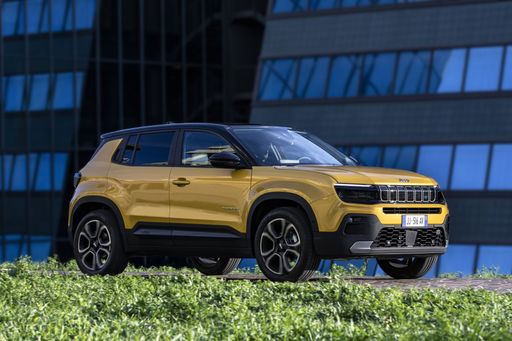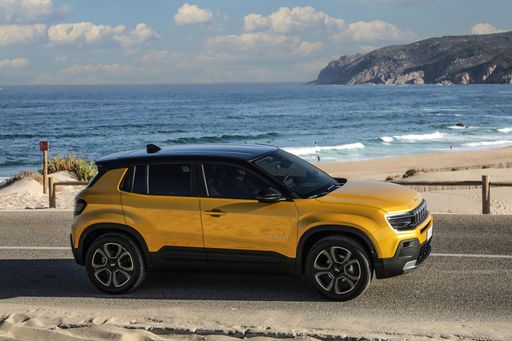Jeep Avenger vs Toyota C-HR - Differences and prices compared
Compare performance (156 HP vs 223 HP), boot space and price (21900 £ vs 29100 £ ) at a glance. Find out which car is the better choice for you – Jeep Avenger or Toyota C-HR?
Costs and Efficiency:
Price and efficiency are key factors when choosing a car – and this is often where the real differences emerge.
Jeep Avenger has a noticeable advantage in terms of price – it starts at 21900 £ , while the Toyota C-HR costs 29100 £ . That’s a price difference of around 7192 £.
Fuel consumption also shows a difference: Toyota C-HR manages with 0.80 L and is therefore convincingly more efficient than the Jeep Avenger with 4.90 L. The difference is about 4.10 L per 100 km.
As for electric range, the Jeep Avenger performs clearly better – achieving up to 400 km, about 332 km more than the Toyota C-HR.
Engine and Performance:
Power, torque and acceleration say a lot about how a car feels on the road. This is where you see which model delivers more driving dynamics.
When it comes to engine power, the Toyota C-HR has a noticeable edge – offering 223 HP compared to 156 HP. That’s roughly 67 HP more horsepower.
In acceleration from 0 to 100 km/h, the Toyota C-HR is distinct quicker – completing the sprint in 7.40 s, while the Jeep Avenger takes 9 s. That’s about 1.60 s faster.
In terms of top speed, the Jeep Avenger performs slight better – reaching 194 km/h, while the Toyota C-HR tops out at 180 km/h. The difference is around 14 km/h.
Space and Everyday Use:
Cabin size, boot volume and payload all play a role in everyday practicality. Here, comfort and flexibility make the difference.
Both vehicles offer seating for 5 people.
In curb weight, Jeep Avenger is noticeable lighter – 1180 kg compared to 1505 kg. The difference is around 325 kg.
In terms of boot space, the Toyota C-HR offers slightly more room – 447 L compared to 380 L. That’s a difference of about 67 L.
In maximum load capacity, the Jeep Avenger performs slight better – up to 1277 L, which is about 122 L more than the Toyota C-HR.
When it comes to payload, Jeep Avenger somewhat takes the win – 502 kg compared to 425 kg. That’s a difference of about 77 kg.
Who wins the race in the data check?
The Toyota C-HR is decisively ahead in the objective data comparison.
This result only shows which model scores more points on paper – not which of the two cars feels right for you.
Costs and Consumption
View detailed analysis
Engine and Performance
View detailed analysis
Dimensions and Body
View detailed analysis

Toyota C-HR
Jeep Avenger
The Jeep Avenger shrinks Jeep's boxy, adventurous styling into a city-friendly electric crossover that looks just as at home on tight streets as it does on muddy weekend lanes. It's a savvy pick for drivers who want go-anywhere attitude without the truck-size ego — practical inside, lively around town and ready to tackle a bit of rough stuff when the mood strikes.
details




Toyota C-HR
The Toyota C-HR cuts a striking figure with its angular styling and coupe-like profile, so you’ll never go unnoticed in the supermarket car park. It balances everyday practicality with a nimble, city-friendly personality, making routine commutes feel a touch more fun without asking for forgiveness.
details




Costs and Consumption |
|
|---|---|
|
Price
21900 - 36900 £
|
Price
29100 - 42800 £
|
|
Consumption L/100km
4.9 - 5.7 L
|
Consumption L/100km
0.8 - 5.1 L
|
|
Consumption kWh/100km
15.50 kWh
|
Consumption kWh/100km
-
|
|
Electric Range
400 km
|
Electric Range
68 km
|
|
Battery Capacity
51 kWh
|
Battery Capacity
-
|
|
co2
0 - 129 g/km
|
co2
17 - 115 g/km
|
|
Fuel tank capacity
44 L
|
Fuel tank capacity
43 L
|
Dimensions and Body |
|
|---|---|
|
Body Type
SUV
|
Body Type
SUV
|
|
Seats
5
|
Seats
5
|
|
Doors
5
|
Doors
5
|
|
Curb weight
1180 - 1520 kg
|
Curb weight
1505 - 1755 kg
|
|
Trunk capacity
325 - 380 L
|
Trunk capacity
350 - 447 L
|
|
Length
4084 - 4088 mm
|
Length
4362 mm
|
|
Width
1776 mm
|
Width
1832 mm
|
|
Height
1527 - 1541 mm
|
Height
1558 - 1564 mm
|
|
Max trunk capacity
1218 - 1277 L
|
Max trunk capacity
1076 - 1155 L
|
|
Payload
494 - 502 kg
|
Payload
375 - 425 kg
|
Engine and Performance |
|
|---|---|
|
Engine Type
Electric, Petrol, Petrol MHEV
|
Engine Type
Full Hybrid, Plugin Hybrid
|
|
Transmission
Automatic, Manuel
|
Transmission
Automatic
|
|
Transmission Detail
Reduction Gearbox, Manual Gearbox, Dual-Clutch Automatic
|
Transmission Detail
CVT
|
|
Drive Type
Front-Wheel Drive, All-Wheel Drive
|
Drive Type
Front-Wheel Drive, All-Wheel Drive
|
|
Power HP
100 - 156 HP
|
Power HP
140 - 223 HP
|
|
Acceleration 0-100km/h
9 - 10.6 s
|
Acceleration 0-100km/h
7.4 - 9.9 s
|
|
Max Speed
150 - 194 km/h
|
Max Speed
175 - 180 km/h
|
|
Torque
205 - 260 Nm
|
Torque
-
|
|
Number of Cylinders
3
|
Number of Cylinders
4
|
|
Power kW
74 - 115 kW
|
Power kW
103 - 164 kW
|
|
Engine capacity
1199 cm3
|
Engine capacity
1798 - 1987 cm3
|
General |
|
|---|---|
|
Model Year
2023 - 2025
|
Model Year
2024 - 2025
|
|
CO2 Efficiency Class
A, D, C
|
CO2 Efficiency Class
C, B
|
|
Brand
Jeep
|
Brand
Toyota
|
What drivetrain options does the Jeep Avenger have?
Available configurations include Front-Wheel Drive or All-Wheel Drive.




